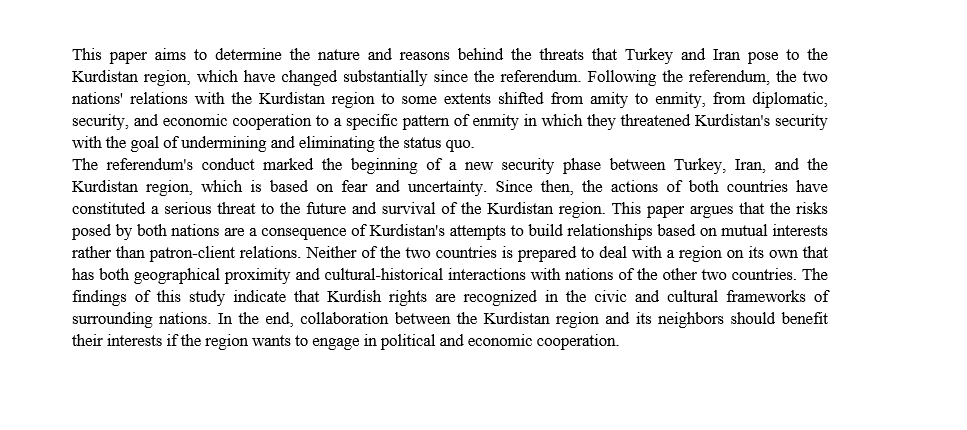The Impact of Turkey's and Iran's Security Threats on the Kurdistan Region Following the 2017-2023 Referendum
DOI:
https://doi.org/10.21271/zjhs.28.SpC.4Keywords:
Security Threats, Referendum, Amity, Enmity, Threats.Abstract
This paper aims to determine the nature and reasons behind the threats that Turkey and Iran pose to the Kurdistan region, which have changed substantially since the referendum. Following the referendum, the two nations' relations with the Kurdistan region to some extents shifted from amity to enmity, from diplomatic, security, and economic cooperation to a specific pattern of enmity in which they threatened Kurdistan's security with the goal of undermining and eliminating the status quo.
The referendum's conduct marked the beginning of a new security phase between Turkey, Iran, and the Kurdistan region, which is based on fear and uncertainty. Since then, the actions of both countries have constituted a serious threat to the future and survival of the Kurdistan region. This paper argues that the risks posed by both nations are a consequence of Kurdistan's attempts to build relationships based on mutual interests rather than patron-client relations. Neither of the two countries is prepared to deal with a region on its own that has both geographical proximity and cultural-historical interactions with nations of the other two countries. The findings of this study indicate that Kurdish rights are recognized in the civic and cultural frameworks of surrounding nations. In the end, collaboration between the Kurdistan region and its neighbors should benefit their interests if the region wants to engage in political and economic cooperation.
References
سەرچاوە کوردییەکان:
١- کتێب:
ئەحمەد، زوبێر، ٢٠٢٢، هەرێمی کوردستان و دراوسێکانی: چ جۆرە پەیوەندییەک؟ هەولێر: سەنتەری توێژینەوەو راپرسی کوردستان٢٤.
سەرچاوە ئینگلیزی:
١- کتێب:
- Bilgin, Pinar (2019) regional security in the Middle East, A critical perspective. Second edition, New York, Routledge, Taylor & Francis Group.
- Bill McSweeney, Security, Identity and Interests: Sociology of International Relations (Cambridge: Cambridge University Press, 1999), 63.
- Buzan Barry & Waever, oli (2003) regions and powers: the structure of international security, Cambridge, Cambridge university press.
- Buzan, Barry (2003) Regional Security Complex Theory in the Post-Cold War World in Theories of New Regionalism, ed. Frederik Soderbaum & Timothy Shaw, New York: Palgrave Macmillan Press.
٢- گۆڤار:
- Aleksandra Kusztal, "Theoretical foundations of regional security in international relations- the overview," Journal of science of the military academy of land forces49, No. 1 (2017): 19.
-Alkış, Mehmet (2022) De facto statehood and natural resources: How oil resources affect the foreign relations of the Kurdish Regional Government of Iraq, the Extractive Industries and Society, 12(1).1-12.
-Athanasios Manis and Tomáš Kaválek, “The Catch-22 in Nineveh: The Regional Security Complex Dynamics between Turkey and Iran.” MERI 3, No.4 (December 2016): 1-15.
-Ayoob, Mohammed (1999) From Regional System to Regional Society: Exploring Key Variables in the Construction of Regional Order, Australian Journal of International Affairs, 53(3), 247-260.
-Bahgat , Gawdat (2005) Saddam Hussein's Legacy, Review of International Affairs ,25 (2), 93-103
- Bezen Coskun, "My Next Door Neighbour Goes Nuclear: Iran’s Nuclear Programme and Regional Security Dynamics,” ECPR Joint Sessions, Workshop 9, Helsinki (May 2007): p. 4.
- Changfeng, Zhao & Temitayo, Otenia (2018)2017 Iraqi Kurdistan’s Referendum for Independence: Causes and Impacts, Humanities and Social Sciences, 6(2), 59-67.
- Coskun, Bezen (2007) My Next Door Neighbour Goes Nuclear: Iran’s Nuclear Programme and Regional Security Dynamics,” ECPR Joint Sessions, Workshop 9, Helsinki.
- Costantini,Irene & Donelli,Federico (2022) Sponsor-proxy dynamics between decentered multipolarity and non-state actors: evidence from the MENA region, Small Wars & Insurgencies, 1-23.
- Esposti, Nicola (2021)The 2017 independence referendum and the political economy of Kurdish nationalism in Iraq, Third World Quarterly, 10(1), 1-17.
- Eyvazov, Annatkhan (2011) some aspects of the theory of regional security complexes as applied to studies of the political system in the post-Soviet space.” Journal of social and political studies, 12(2),17-24.
- Hilgers, Tina, (2012) Clientelism and conceptual stretching: differentiating among concepts and among analytical levels, Theory and society, 40(1), 567–588.
- Masarat, (2018) The Kurdish Referendum: Between Survival and Independence, King Faisal center for research and Islamic studies, 33(1), 1-7.
- O’Driscoll, Dylan & Baser, Baher (2019) Independence Referendums and Nationalist Rhetoric: The Kurdistan Region of Iraq, Third World Quarterly, 40(11), 2016-2034.
- Sagnic, Ceng (2010) Mountain Turks: State ideology and the Kurds in Turkey, Information, Society and Justice, 3 (2), 127-134.
- Sumer, Fahrettin & Joseph, Jay (2018) the paradox of the Iraqi Kurdish referendum on independence: contradictions and hopes for economic prosperity, British Journal of Middle Eastern Studies, 45(4), 574-588.
- Yandas, Osman (2005) Emerging regional security complex in central Asia: Cooperation organization (SCO) and challenges of the post 9/11 world. Ankara, Middle East technical university.
٣- ئینتەرنێت:
- AFP news agency, (2017)Erdogan warns of 'ethnic war' risk over Iraqi Kurdish referendum,(online) Last Accessed 27 January 2024 at: https://youtu.be/HOph0pR_W2I?si=sdM9iOzDfX35SE3u.
- Karadeniz, Tulay (2017) Recep Tayyip Erdogan ready to close Turkish border with Iraq in response to Kurdish tensions, (online), independent, Last Accessed 27 January 2024 at: Recep Tayyip Erdogan ready to close Turkish border with Iraq in response to Kurdish tensions | The Independent | The Independent.
- Regencia, Ted (2017) Erdogan, Rouhani united in opposition to Kurdish state, (online), Aljazeera, Last Accessed 27 January 2024 at: Erdogan, Rouhani united in opposition to Kurdish state | Kurds News | Al Jazeera.

Downloads
Published
Issue
Section
License
Copyright (c) 2024 Shvan Hamasdiq Abdulrahman , Salih Mala Omar Issa

This work is licensed under a Creative Commons Attribution 4.0 International License.









